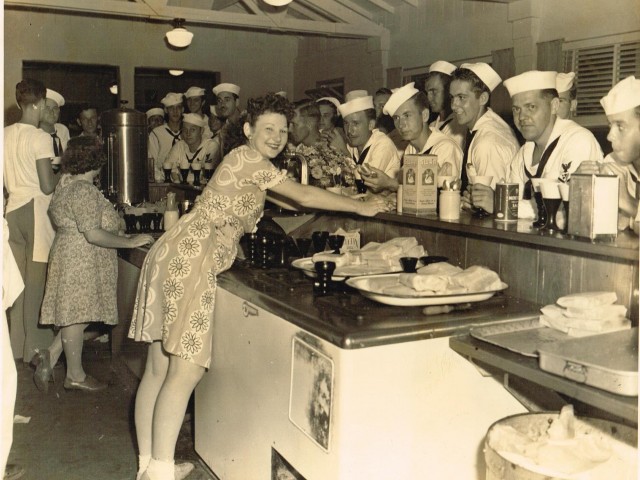I was born in New Castle, Pennsylvania and moved to Ft. Pierce, Florida, in June of 1940. Shortly after we moved to Ft. Pierce the Japanese attacked Hawaii and we entered WWII.
Back then the newspapers were not allowed to print everything that was going on. There was a slogan: “a slip of the lip will sink a ship!”
When a boat was blown up off the coast of Fort Pierce, we could feel the vibration in our homes. There was no news on the radio or anything in the paper and for some reason we never talked about it. I think being teenagers, we had no idea how serious it all was.
One late afternoon, two girlfriends and I were sitting on the beach watching a convoy of several big ships go by. They were so close that we could see the sailors wave their shirts at us and we knew they were watching us. That night every one of those ships was sunk. We went to the beach the next day and watched the ships still burning—I don’t know if there were any survivors. This was not on the news or in the paper.
The Ft. Pierce beach was an island by itself and the only way to it was over a drawbridge. There were a few houses on the beach, a Coast Guard station, a Coast Guard tower that was manned 24/7 and a casino with a dressing room, rest room, and a snack bar that was right on the beach.
The Coast Guard fellows had one day off, one day stand by, and one day duty on the tower. It was within walking distance of the casino. They usually spent a lot of their “time-off days” at the casino. As dating teenagers, we too spent our free time at the casinos when we went to the beach. As we had no cars and gas was rationed, we rode our bikes everywhere or we walked.
One night Hazel and I went to a movie and in the middle of it, an usher came in and announced that all Coast Guard men were to report to duty, then all Coast Guard auxiliary were to report, and then any doctors were to report to the hospital, and so on until there were just a few of us left in the theatre.
When I got home, my dad took us over and parked our car by the hospital and we saw ambulances go to the hospital and then to the funeral home. Later we learned a whole American convoy had been bombed, burned, and sunk. We often heard bombing blasts that were so drastic that our windows and walls shook. A couple of places in town could hardly keep glass in their windows because of the vibrations.
We had a United Service Organization (USO) in Fort Pierce which organized programs, services, and entertainment for the troops. Any young, unmarried women who wanted to volunteer had to be approved by a committee of the organization before they could participate in the activities.
All activities were well chaperoned. Camp Murphy, now Jonathon Dickenson State Park, was a radar military base, located south of Stuart. They would bus us girls to Camp Murphy once a week to a dance. The bus was stopped at the base entrance and thoroughly inspected. We were not allowed to leave the bus until we got to the dance hall and then we were escorted by military men on each side of the sidewalk and not allowed to leave the dance hall at any time.
Ft. Pierce was financially in bad shape during the war. There were no tourists and no money was coming in. The politicians were trying to get a military base to come into town to bring in money and finally, a surprise! A train load of sailors came into Ft. Pierce; no one knew they were coming so the city did not know where to put them or how to feed them.
A Red Cross city manager and everyone in town went to work to solve this problem and the result was an amphibious Navy training base in Ft. Pierce. They took over the south beach which included all the mosquitos and sand flies! The beach closed to everyone except military. Again we had a lot of explosions as they built concrete waits and then practiced blowing them up. By then, we were used to the explosions so didn’t think anything about them.
During the time I lived in Ft Pierce I met my husband Les who was in the Navy as Medical officer. After discharged from the Navy, Les took employment in banking and was also in the National Guard. Over time his banking career took him down the east coast of Florida and eventually landed in Miami were we took up permanent residency in Homestead. We’ve been here since 1972 and love it.

